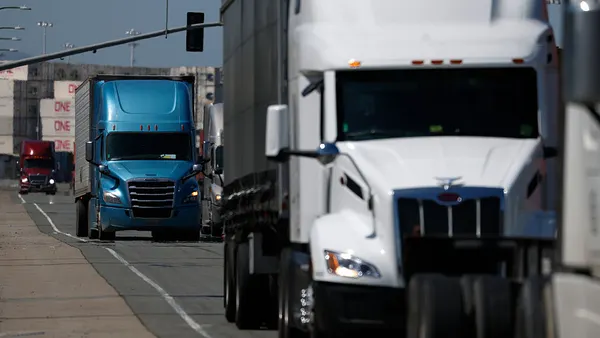Dive Brief:
- Daseke has 10 actionable M&A opportunities, with three in "advanced discussions," in its pipeline, according to an earnings presentation Tuesday.
- The carrier said it has "revamped its M&A and integration strategy." In the past, Daseke's approach led to inefficiencies within the operating companies, which required restructuring that then-COO Chris Easter outlined in August 2019.
- Part of Daseke's new strategy is streamlining operations. For the company to grow, "there will be further operating company consolidations. There will be investments in technology. And there will be coordinated, thoughtful standardization across our platform," CEO Jonathan Shepko said Tuesday on an earnings call.
Dive Insight:
The country's largest carriers are flush with cash that they're ready to spend on growth, as the industry benefits from a supply/demand imbalance of trucks. There's a case for continued consolidation in the industry, Daseke CFO Jason Bates said on Tuesday's call.
Schneider started 2022 by announcing its $263 million acquisition of TL carrier Midwest Logistics Systems to expand its dedicated offerings. And TL carrier Ascend announced Tuesday it acquired Dedicated Transport Solutions, also boosting dedicated services.
M&A sprees are nothing new for Daseke. But its approach to them is.
The Daseke leadership team says it is more "diligent" than it has been when it comes to making deals. The company now looks for "full-cycle earning potential and long-term equity appreciation," Bates said.
While Easter led early consolidation efforts, the new M&A approach is now spearheaded by Shepko. That started in earnest when Shepko became interim CEO.
"M&A will look differently, going forward," Shepko said on an earnings call one year ago. In that call, he referred to the new strategy as "M&A 2.0," which would focus on avoiding incremental, redundant fixed costs.
The strategy starts with going after the right deals, he said on Tuesday. But onboarding "the right way" is a critical next step.
"Instead of going out and continue to wave our arms to the market ... which we've got kind of accused of over the last few years, we feel like we're starting to really build credibility with the market," Shepko said.
Under the previous strategy, it would be common for Daseke to buy a company and bring with it another technology platform, instead of migrating to a standardized, cross-business system. Doing so would create duplicative back-office expenses, Shepko said.
Now, Daseke is spending money on bolstering its technology platforms, so it can pull back-office functions from the companies it acquires into its system.
The carrier intends to "deploy roughly $10 million of net capital expenditures toward systems enhancements and upgrades as we further align and integrate our technology stack," according to prepared remarks from Bates.
Daseke's homogenization efforts are still in the early stages. Shepko said the assumption is any efficiencies gained will be offset by the costs, but there could be some monetary benefit toward the end of the year.











